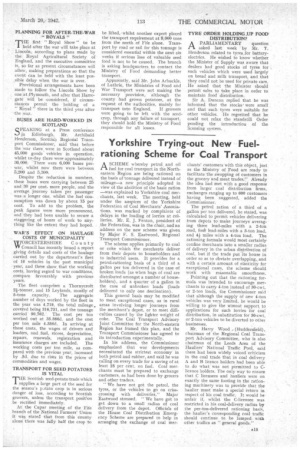Yorkshire Trying-out New Fuelrationing Scheme for Coal Transport A SCHEME whereby
Page 17

If you've noticed an error in this article please click here to report it so we can fix it.
petrol and oil fuel for coal transport in the Northeastern Region are being rationed on the basis of tonnage delivered instead of mileage—a new principle adopted in view of the abolition of the basic ration —was explained to Yorkshire coal merchants, last week. The meeting, held under the auspices of the Yorkshire Federation of Coal Merchants' Associations, was marked by complaints of delays in the loading of lorries at collieries. Mr. E. J. Fenton, president of the Federation, was in the chair, and an address on the new scheme was given by Major F. S. Eastwood, Regional Transport Commissioner.
The scheme applies primarily to coal or coke which the merchants deliver from their depots to householders and to industrial users. It provides for a petrol-rationing basis of a third of a gallon per ton delivered in the case -of broken loads (as when bags of coal are distributed amongst a number of householders), and a quarter of a gallon in the case of unbroken loads (loads delivered to only one destination).
This general basis may be modified to meet exceptional cases, as in rural areas involving longer journeys from the merchant's depot, or to meet difficulties caused by the lighter weight of coke. The Coal Transport Advisory Joint Committee for the North-eastern Region has framed this plan, and the Transport Commissioner has agreed to its introduction experimentally.
In his address, the Commissioner emphasized that war developments necessitated the strictest economy in both petrol and rubber, and said he was calling on every trade for a saving of at least 25 per cent, on fuel. Coal merchants must be prepared to exchange customers, as had been done by grocers and other traders.
" We have not got the petrol, the tyres, or the vehicles to go on crisscrossing with deliveries," Major Eastwood stressed, " We have got to get down to a small radius of coal delivery from the depot. Officials of the House Coal Distribution Emergency Scheme are prepared to help in arranging the exchange of coal mer
chants' customers with this object, just as the Ministry of Food are ready to facilitate the swopping of customers in the grocery and meat trades." Already the idea had met with a good response from larger coal distribution firms. exchanges ranging up to 600 customers having been suggested, added the Commissioner.
The petrol ration of a third of a gallon per ton delivered, he stated, was calculated to permit vehicles delivering from depots to make journeys averaging three lead-miles with a 2-ton ioad, foullead-miles with a 3-ton load, and 4i miles with a 4-ton load. The rationing formula would most certainly confine merchants into a smaller radius of delivery in the urban distribution of coal, but if the trade put its house in, order so as to Obviate overlapping, and with a certain amount of elasticity for exceptional cases, the scheme should work with reasonable smoothness.
Pointing out that the rationing formula was intended to encourage merchants to carry 4-ton instead of 30-cwt. or 2-ton loads, the Commissioner said that although the supply of new 4-ton vehicles was very limited, he would be willing to give the utmost support to applications for such lorries for coal distribution, in substitution for 30-cwt. or 2-ton vehicles to be diverted to othet businesses.
Mr. Harry Wood (Huddersfield), chairman of the Regional Coal Transport Advisory Committee, who is also chairman of the Leeds Area of the Hauliers' National Traffic Pool, said there had been widely voiced criticism in the coal trade that in coal delivery A and B licence holders had been able to do what was not permitted to Clicence holders. The only way to ensure that C licensees and hauliers were on exactly the same footing in the rationing machinery was to provide that the haulier must make a special return in respect of his coal traffic. It would he unfair if, whilst the C-licensee was restricted in his coal-delivery radius by the per-ton-delivered rationing basis, the haulier's corresponding coal traffic should continue to be lumped with other traffics as " general goods."




















































